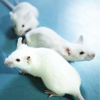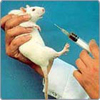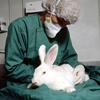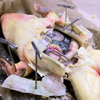
 |
 |
 |
 |
|||||
Pure Research |
Applied Research |
Drug Testing |
Education |
|||||
It is estimated that from 50—100 million vertebrate (having a backbone or spinal column) animals worldwide are used annually for scientific research or drugs and products testing, most of who are either killed during the testing or euthanized shortly thereafter. These experiments, largely un-regulated in law and generally not included in yearly statistics, are carried out inside universities, medical schools, pharmaceutical companies, farms, defense-research establishments, and commercial facilities that provide animal testing services to industry. The majority of the animals used are bred specifically for research, while a number of them are caught in the wild, or supplied by animals pounds. Cats and dogs are also often stolen from owners. Experiments used by scientists can be split into three very broad categories: pure research (experiments are performed that have no direct commercial application and are used only to advance knowledge); applied research (which is used only to solve specific biological problems or develop commercial products for medical or non-medical use); and toxicology testing, where commercial products are tested on animals to measure potential adverse reactions to the ingredients used. |
||||||||